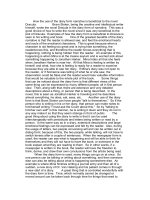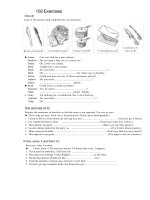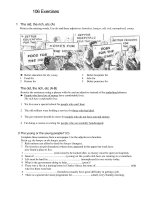Understanding the use of infinitives
Bạn đang xem bản rút gọn của tài liệu. Xem và tải ngay bản đầy đủ của tài liệu tại đây (12.66 KB, 1 trang )
Understanding the use of infinitives
The infinitive is the base form of the verb. Examples are: write, bring, take, make, sing, dance etc. The infinitive
usually takes the preposition ‘to’ with it. Examples are: to write, to bring, to take, to make, to sing, to dance etc.
When the infinitive is used with the preposition ‘to’ it is called the ‘to-infinitive’.
The ‘to-infinitive’ is a non-finite verb. That means its form does not change when the number or person or the
subject changes.
Study the examples given below.
I want to go.
She wants to go.
They wanted to go.
We will want to go.
As you can see, the infinitive form ‘to go’ remains the same even when the subject or tense changes.
Although the infinitive is formed by putting ‘to’ before the verb, it does not act as a verb. In fact, an infinitive
serves the same purpose as a noun. It can act as the subject or object of the verb.
Infinitive as the subject of the sentence
The infinitive can act as the subject of the verb. Study the examples given below.
To err is human.
To make mistakes is easy.
To wait for people who would never turn up made him angry.
Infinitive as Object of a Verb
The infinitive can act as the object of a verb.
He needs to concentrate on his studies.
We want to open new stores in Europe.
I hope to hear from you.
Note that some verbs cannot be followed by infinitives. They require gerunds (-ing forms). As there are no rules
regarding this, you have to study which verbs take infinitives and which verbs take gerunds.
Infinitive as Subject Compliment
The infinitive can also act as a subject complement.
A subject complement is a word or phrase that says something about the subject. Subject complements are
common after the linking word ‘be’.
The most important thing is to remain optimistic.
Stay on top of your writing! Download our grammar guide from www.englishgrammar.org to stay up-to-date.
Powered by TCPDF (www.tcpdf.org)









